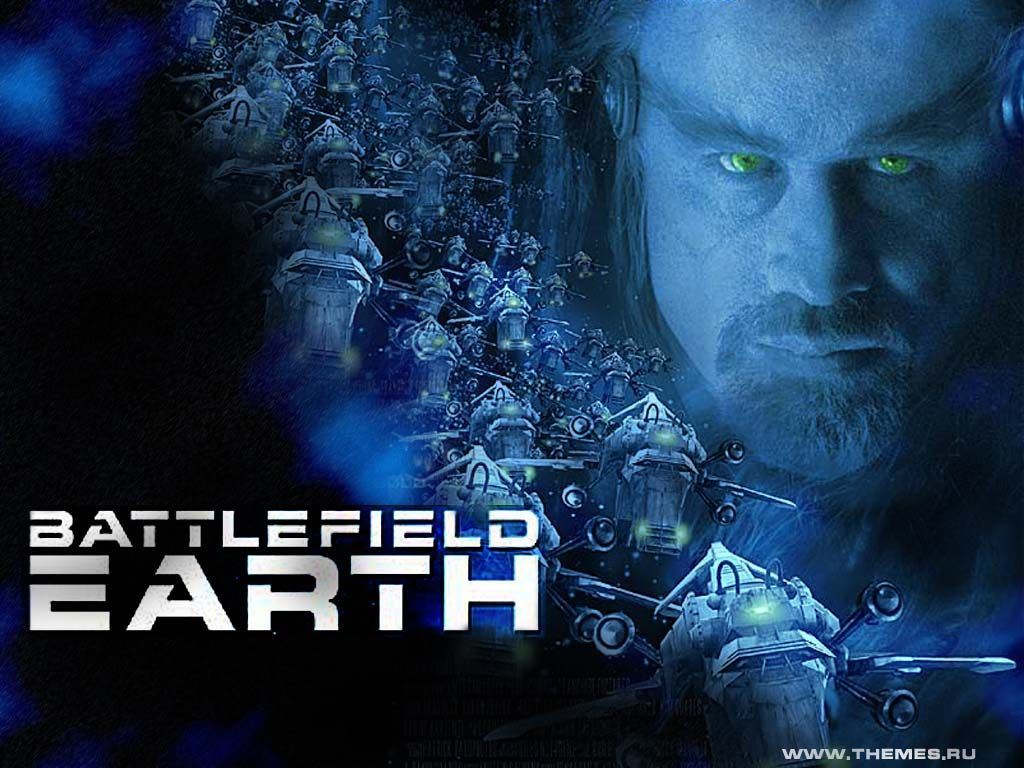Battlefield Earth (2000)

Battlefield Earth (2000), directed by Roger Christian and based on the novel by L. Ron Hubbard, stands as one of the most ambitious and controversial films in the science fiction genre. The film, starring John Travolta, Barry Pepper, and Forest Whitaker, sought to bring Hubbard’s 1982 novel to life, promising an epic tale of intergalactic conflict and human resistance. Despite its high aspirations, Battlefield Earth was met with critical scorn and commercial failure, earning a place in cinematic infamy. This essay explores the film’s plot, characters, themes, and significance, providing a comprehensive analysis of its place in science fiction history.

Battlefield Earth is set in the year 3000, a time when Earth has been subjugated by the Psychlos, a malevolent alien race that has dominated the planet for nearly a millennium. The film’s narrative centers on the struggle of a small group of human rebels led by a young man named Jonnie Goodboy Tyler (Barry Pepper). The humans, living in a post-apocalyptic world ravaged by the Psychlos, are largely ignorant of their oppressors’ technology and motives.
The story unfolds as Jonnie, who escapes from his primitive tribe, discovers the remnants of a bygone human civilization and uncovers critical information about the Psychlos’ weaknesses. He joins forces with a group of freedom fighters and develops a plan to overthrow the alien occupiers. Central to the plot is the character of Terl (John Travolta), a corrupt and power-hungry Psychlo who becomes the primary antagonist. As Jonnie and his allies launch their rebellion, they engage in a series of battles against the superior alien forces, aiming to liberate Earth and restore human autonomy.
The narrative structure of Battlefield Earth is marked by its grand scale and action-driven sequences. However, the film’s execution often fails to match its ambitions, resulting in a storyline that critics argue is disjointed and lacking in depth. The pacing alternates between high-energy action scenes and slower, character-driven moments, but the overall coherence of the plot is frequently undermined by its convoluted execution.

The film’s character development is one of its most criticized aspects. Jonnie Goodboy Tyler, portrayed by Barry Pepper, is meant to be the heroic figure leading the resistance against the Psychlos. However, his character arc is often overshadowed by the film’s focus on action and spectacle, leaving him as a somewhat one-dimensional protagonist. Pepper’s performance is competent but lacks the depth needed to fully engage the audience with Jonnie’s personal journey.
John Travolta’s portrayal of Terl, the Psychlo antagonist, is perhaps the most memorable aspect of the film. Travolta embraces the role with exuberant zeal, delivering a performance that ranges from over-the-top to downright bizarre. His portrayal of Terl as a megalomaniacal alien overlord is both a strength and a weakness of the film, contributing to its campy and inconsistent tone. While Travolta’s energetic performance provides some entertainment value, it also underscores the film’s failure to achieve a balanced and compelling villain.
Supporting performances by Forest Whitaker, who plays Ker, Terl’s subordinate, and other actors like Kim Coates and Sacha Baron Cohen are overshadowed by the film’s broader issues. Whitaker’s role is significant but does not offer the depth needed to make a lasting impact, while the other supporting characters struggle with limited development and screen time.
Battlefield Earth attempts to explore several themes, including resistance against oppression, the clash between advanced and primitive societies, and the resilience of the human spirit. The film’s portrayal of humanity’s struggle against an alien tyrant echoes classic science fiction themes of rebellion and liberation. However, the execution of these themes is often muddled by the film’s chaotic storytelling and inconsistent tone.
The theme of resistance is central to the narrative, with Jonnie and his allies fighting against the overwhelming power of the Psychlos. The film aims to convey a message about the importance of standing up against tyranny and the possibility of overcoming seemingly insurmountable odds. Yet, the film’s inability to develop its characters and plot effectively undermines the impact of this theme.
Symbolism in Battlefield Earth includes the depiction of the Psychlos as a metaphor for oppressive forces and the struggle of humanity as a symbol of hope and resilience. The Psychlos’ control over Earth and their exploitation of its resources serve as a critique of colonialism and environmental degradation. However, these symbolic elements are overshadowed by the film’s chaotic narrative and lack of subtlety in its execution.

The visual and technical aspects of Battlefield Earth contribute to its reputation as a cinematic misfire. The film’s special effects, designed to depict the alien technology and post-apocalyptic landscape, were intended to create a grand and immersive experience. However, the execution of these effects is often criticized for being dated and unconvincing, detracting from the film’s overall impact.
The film’s cinematography and production design attempt to convey a vast and dystopian world but often fall short of achieving a coherent and visually appealing result. The use of practical effects and CGI is inconsistent, leading to a visual style that lacks cohesion and fails to fully immerse the audience in the film’s world.

Battlefield Earth was met with widespread critical condemnation upon its release. Critics lambasted the film for its poor storytelling, uneven performances, and overall lack of coherence. The film’s ambitious scope and high production values were overshadowed by its execution, leading to it being considered one of the worst films of the decade.
The film’s commercial performance was equally disappointing, with it failing to recoup its production costs and earning a reputation as a box office flop. Despite its failure, Battlefield Earth has garnered a certain cult status among enthusiasts of so-bad-it’s-good cinema. Its reputation as a cinematic disaster has led to it being discussed and analyzed in the context of film history and the science fiction genre.
Battlefield Earth (2000) remains a notable example of a high-profile film that fell short of its lofty ambitions. Despite its grand scale and attempts to address themes of resistance and human resilience, the film’s execution was marred by poor storytelling, uneven performances, and technical shortcomings. John Travolta’s over-the-top portrayal of the antagonist and the film’s ambitious yet flawed visual effects contribute to its status as a cinematic misfire. While Battlefield Earth failed to achieve its intended impact, its place in film history as a notable failure provides valuable insights into the challenges of adapting complex science fiction narratives to the screen. Its legacy serves as a reminder of the fine line between ambition and execution in the world of filmmaking.










